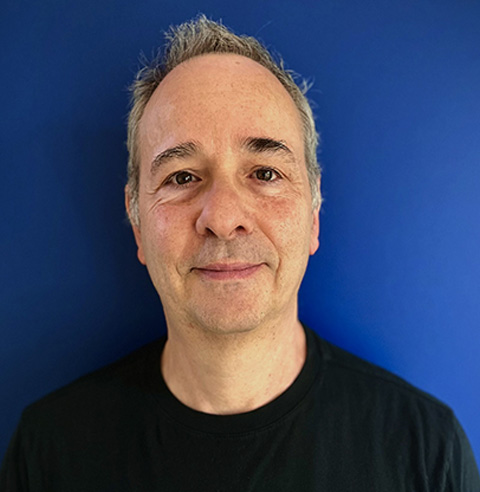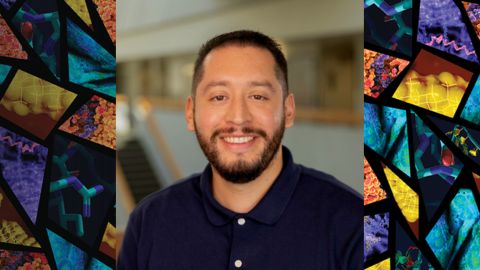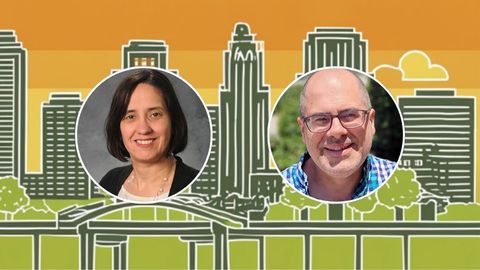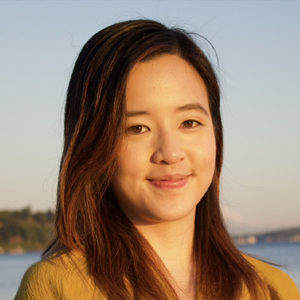
Elucidating how chemotherapy induces neurotoxicity
As a child, Andre Nussenzweig did everything he could to avoid going into science. Both his parents were scientists, and so were many of his relatives. He really wanted to do something different, and his favorite activity was basketball.
“I’m still obsessed with the sports,” Nussenzweig said. “But then I realized that becoming a professional basketball player wasn’t in the cards, so I should find something else.”

Nussenzweig explored philosophy, business and the social sciences before deciding to major in physics in college. He trained as a physicist in his Ph.D. program at Yale, and then in his first postdoctoral fellowship in Paris.
“Science is more me,” he said. “But it still has a competitive edge, so in a way there are some interesting parallels with sports.”
Nussenzweig said he found it challenging to make advances in physics because so much was already known. In biology, however, scientists’ predictions often don’t come true. And while unexpected results are sometimes disappointing, they make room for new discoveries.
“Physics didn’t have the same excitement that I saw in biology,” he said.
At first, Nussenzweig considered switching to structural biology. Many physicists who wanted to transition into biology chose this path, he said, because there are some overlaps between the two.
But, the plan didn’t end up working for him. He started taking courses in molecular biology and really enjoyed it. So, he did another postdoctoral fellowship at Memorial Sloan–Kettering Cancer Center for some hands-on experience, then joined the National Institutes of Health in 1998 where he started his own lab.
“The key thing is to be really honest with yourself, see what you enjoy and be fearless about pursuing it, whatever it is,” Nussenzweig said.
“Even if your background and your training aren’t great fits for the role,” he added. “Because you’ll just learn it as you go.”
Nussenzweig will receive the 2025 Bert and Natalie Vallee Award in Biomedical Science, which the American Society for Biochemistry and Molecular Biology presents to an established scientist for outstanding accomplishments in basic biomedical research. His lab studies how DNA damage arises in cancer, as well as in noncancerous, nondividing cells such as neurons.
A detour from heat-shock to DNA repair
Andre Nussenzweig stumbled on the study of DNA damage and repair serendipitously during his postdoc at Sloan-Kettering when his team was working on a project they thought was related to heat-shock proteins. Nussenzweig had generated a knockout mouse for a protein he believed was implicated in the heat-shock response.
“It turned out that gene had nothing to do with heat-shock,” he said. “Instead, it was involved in DNA repair.”Nussenzweig also studies chemotherapies, which purposely induce DNA damage. Specifically, his lab has been looking into the neurotoxic side effects. Although chemotherapy is constantly improving, he said, patients often end up with persistent neurological symptoms and cognitive impairment. Nussenzweig’s team is interested in understanding how different kinds of chemotherapy cause neuron loss or toxicity and how to prevent it.
“This is a really big problem in the field,” he said, “and not many people have worked on understanding mechanisms by which chemotherapy induces neurotoxicity.”
Andre Nussenzweig will present a talk titled “Maintaining genome stability” at the 2025 ASBMB Annual Meeting, April 12–15 in Chicago.
ASBMB 2025 award winners
Read profiles of all the society’s 2025 honorees who will receive their awards and give talks at the ASBMB Annual Meeting, April 12–15 in Chicago.
From receptor research to cancer drug development: The impact of RTKs
Joseph Schlessinger receives the ASBMB Herbert Tabor Research Award.
Computational and biophysical approaches to disordered proteins
Rohit Pappu receives the DeLano Award for Computational Biosciences.
Leading the charge for gender equity
Nicole Woitowich receives the ASBMB Emerging Leadership Award.
Helping underrepresented scientists feel seen
Benjamin Garcia receives the ASBMB Ruth Kirschstein Diversity in Science Award.
Transforming learning through innovation and collaboration
Neena Grover receives the William C. Rose Award for Exemplary Contributions to Education.
Curiosity turned a dietitian into a lipid scientist
Judy Storch receives the Avanti Award in Lipids.
Elucidating how chemotherapy induces neurotoxicity
Andre Nussenzweig receives the Bert and Natalie Vallee Award.
What seems dead may not be dead
Vincent Tagliabracci receives the Earl and Thressa Stadtman Distinguished Scientist Award.
'You can't afford to be 15 years behind the parasite'
David Fidock receives the Alice and C.C. Wang Award in Molecular Parasitology.
Guiding grocery carts to shape healthy habits
Robert Helsley receives the Walter A. Shaw Young Investigator in Lipid Research Award.
Enjoy reading ASBMB Today?
Become a member to receive the print edition four times a year and the digital edition monthly.
Learn moreGet the latest from ASBMB Today
Enter your email address, and we’ll send you a weekly email with recent articles, interviews and more.
Latest in People
People highlights or most popular articles

2025 ASBMB election results
Learn about the new president, secretary, Council members and committee members.

2025 PROLAB awardees announced
Seven early-career scientists receive grants to advance their research by working in North American labs.

Yu receives early career research award
He will receive $35,000 to fund his research on the proteotype and cell signaling.

Neurobiology of stress and substance use
MOSAIC scholar and proud Latino, Bryan Cruz of Scripps Research Institute studies the neurochemical origins of PTSD-related alcohol use using a multidisciplinary approach.

Hargrove recognized for leadership
He is among more than 50 individuals from the Iowa State University College of Liberal Arts and Sciences to receive recognition for their departmental dedication and contributions.

Teach, learn & transform biochemistry education
Meet the co-chairs of the 2025 ASBMB meeting on reimagining undergraduate education in the molecular life sciences to be held July 24–27, 2025 in St. Paul, Minnesota.

